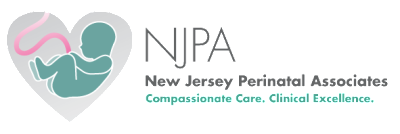March 2021 Updates from NJPA
COVID-19
On March 11, 2020, the World Health Organization declared the COVID‐19 outbreak (caused by SARS‐CoV‐2) a pandemic. Communication from the CDC, SMFM and ACOG to obstetric care providers about COVID‐19 and how best to advise and manage pregnant patients is imperative and rapidly evolving. With regard to COVID‐19 infection in pregnancy and antenatal surveillance, SMFM and ACOG support the following:
Do women with COVID‐19 need additional antenatal surveillance?
- Very little is known about the natural history of pregnancy after recovery from COVID‐19
- Adverse obstetrical and perinatal outcomes reported with other respiratory viral infections have been extrapolated to COVID‐19 due to limited available data
- Other respiratory viral infections, such as influenza, SARS‐CoV and MERS‐CoV, have been associated with low birth weight and preterm birth, generally thought to be due to the severity of maternal illness
- A mid‐trimester anatomy ultrasound may be considered following periconception/first trimester infection Interval fetal growth assessments could be considered depending on the timing and severity of infection with the timing and frequency informed by other maternal risk factors
- Antenatal testing is reserved for routine obstetrical indications
In the setting of COVID‐19 infection during pregnancy and no other concurrent conditions, NJPA recommends a fetal growth assessment at 32 weeks gestation. Currently, NJPA is not considering COVID‐19 infection as an indication for antepartum fetal testing.
COVID-19 Vaccine
The CDC has presented a summary of v‐safe (after vaccination health checker) data as of February 16th, 2021 with regards to COVID‐19 vaccine safety in pregnancy. V‐safe participants who report a pregnancy following COVID‐19 vaccination are actively contacted to enroll in a pregnancy registry.
As of February 16th, 2021, a total of 30,494 pregnancies have been self‐reported to v‐safe. A total of 1,815 pregnant women have enrolled in the registry which include 275 completed pregnancies, including 232 live births.
To date, there have been no unexpected pregnancy or infant outcomes related to COVID‐19 vaccination during pregnancy. The adverse events observed among pregnant women in v‐safe do not indicate any safety issues.
Genetics Corner:
NIPT for single gene disorders
ACOG has reaffirmed their practice advisory regarding the use of cell‐free DNA to screen for single‐gene disorders that was originally released in February of 2019.
The use of cell‐free DNA technology has broadened the application of screening for fetal aneuploidy to screening for fetal single‐gene disorders that can include various skeletal dysplasias, fetal sickle cell disease, etc.
Although this technology is available clinically and marketed as a single gene disorder prenatal screening option (often in the presence of advanced paternal age), there has not been sufficient data to provide information regarding accuracy and positive and negative predictive values in the general population.
For this reason, single‐gene cell‐free DNA screening is not currently recommended in pregnancy.
Meet our perinatologist…
Edward Wolf, MD
 Dr. Wolf graduated from Georgetown University School of Medicine in Washington, DC prior to completing his residency in Obstetrics and Gynecology at the National Naval Hospital in San Diego, California. He completed his fellowship in Maternal-Fetal Medicine at the University of Connecticut. He then served as the Associate Director of the Division of Maternal-Fetal Medicine at the National Naval Medical Center in Bethesda, Maryland and Assistant Residency Director at the Uniformed Services University of the Health Sciences and the National Institutes of Health. He has held a number of prestigious positions in his field at hospitals and universities throughout New Jersey, Connecticut, and Maryland.
Dr. Wolf graduated from Georgetown University School of Medicine in Washington, DC prior to completing his residency in Obstetrics and Gynecology at the National Naval Hospital in San Diego, California. He completed his fellowship in Maternal-Fetal Medicine at the University of Connecticut. He then served as the Associate Director of the Division of Maternal-Fetal Medicine at the National Naval Medical Center in Bethesda, Maryland and Assistant Residency Director at the Uniformed Services University of the Health Sciences and the National Institutes of Health. He has held a number of prestigious positions in his field at hospitals and universities throughout New Jersey, Connecticut, and Maryland.
Dr. Wolf’s research interests include multiple gestations, preterm birth, and antepartum fetal evaluation.
